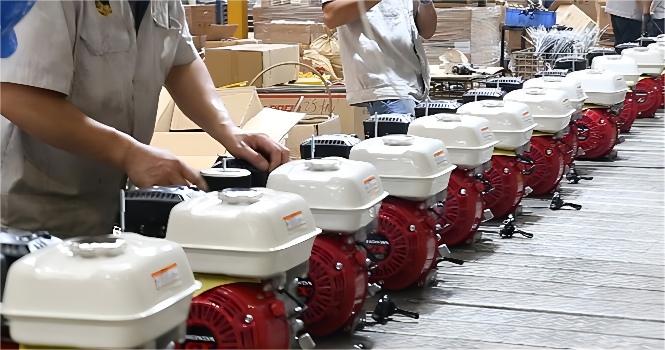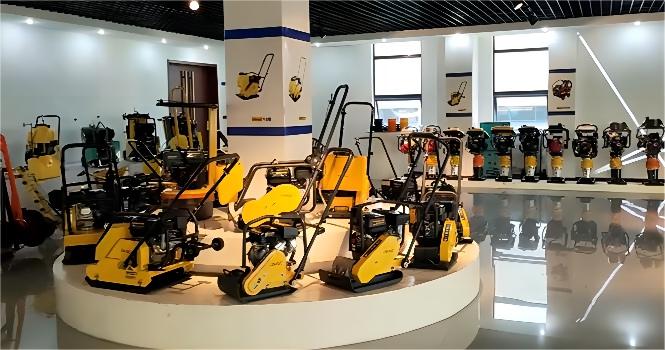Rammer Compactor PME-RM65
When you are looking for a rammer compactor, we can assist you in selecting the most suitable tamping rammer for your business.
Rammer Compactor PME-RM65
The PME-RM65 Rammer Compactor is a powerful, reliable tool designed for professional contractors tackling demanding soil compaction jobs. Featuring a robust 345 x 285 mm foot and delivering a high tamping force of 13 KN, it reaches a leap height of 85 mm, making it ideal for compacting tough soils in a range of applications.
Powerful Performance
The PME-RM65 is powered by a choice of Honda GX100 or Robin EH09 engines, both known for durability and consistent performance. Its air-cooled, single-cylinder, 4-stroke petrol engine is optimized for efficiency and reliability, supported by a generous 2.8 L fuel tank for extended operation on the job. With a frequency of 680 VPM, the PME-RM65 provides powerful, consistent impact, suitable for compacting cohesive and challenging soil types, making it a go-to solution for even the toughest compaction tasks.
Versatile Application
Designed for optimal performance in narrow and confined spaces, the PME-RM65 excels in applications requiring precise and powerful compaction, such as foundation preparation and trench work. Its design and impact force make it ideal for cohesive soils like clay and silt, as well as mixed soils, ensuring maximum stability for subgrades and bases. This rammer compactor meets the needs of contractors, rental services, and any professional requiring high-powered, versatile compaction equipment.
Built to Last
Durability is at the core of the PME-RM65’s construction. Made from high-quality materials, it is engineered to withstand the demands of rigorous, continuous use on tough job sites. The sturdy build and reliable performance make it perfect for projects like subgrade preparation, trench compaction, and asphalt repair, providing long-lasting value and dependability.
Applications
- Foundation and Footing Compaction
- Trench Compaction for Utility and Pipeline Installation
- Subgrade and Base Preparation
- Retaining Wall Base Compaction
- Roadway and Pavement Repair Work
- Cohesive and Mixed Soil Compaction (e.g., clay, silt)
- Soil Stabilization for Landscaping
- Patchwork on Asphalt Surfaces
- Confined or Narrow Space Compaction
With its superior tamping force, reliable engine, and durable construction, the PME-RM65 Rammer Compactor is engineered for high-performance soil compaction, making it a valuable asset for professional contractors and equipment rental providers alike.
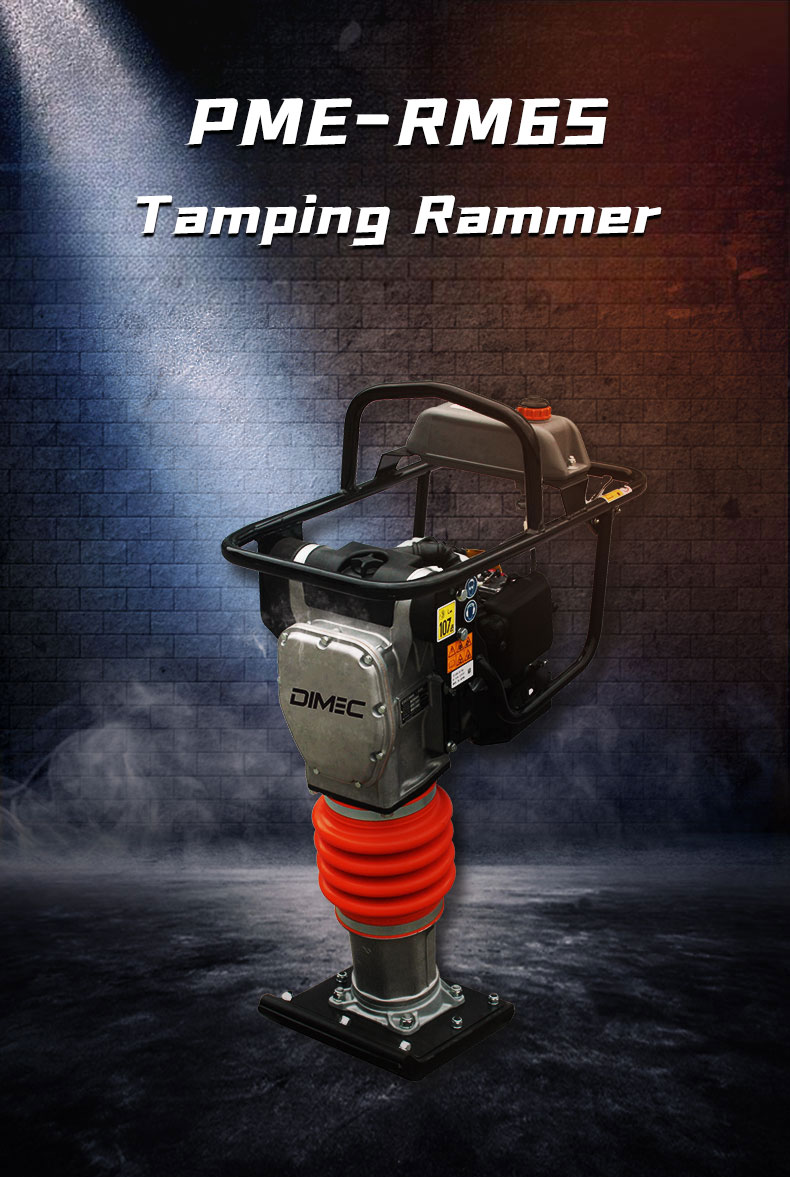


Key Specifications
| Model | Rammer Compactor PME-RM65 |
|---|---|
| Engine | Honda GX100; Robin EH09 |
| Engine type | Air-cooled, single cylinder, 4-stroke, petrol engine |
| Fuel tank [L] | 2.8 |
| Leap height [mm] | 85 |
| Frequency [VPM] | 680 |
| Tamping force [KN] | 13 |
| Plate size (LxW) [cm] | 345x285 |
| N.W./G.W. [kg] | 68/78 |
| Package (LxWxH) [cm] | 72x38x108 |
ADVANTAGE
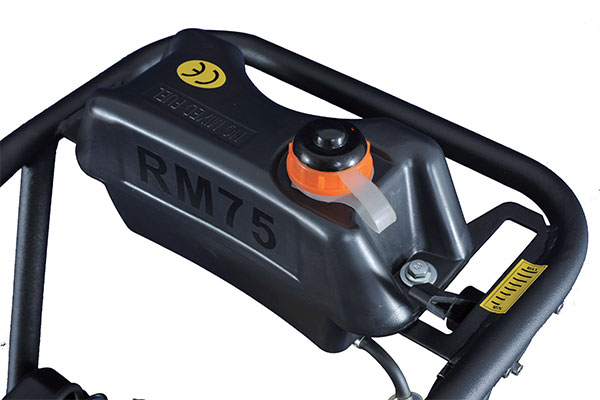
Reinforced Fuel Tank
The fuel tank is built from impact-resistant materials with secure fittings, ensuring reliable fuel storage and preventing leakage under demanding work conditions.
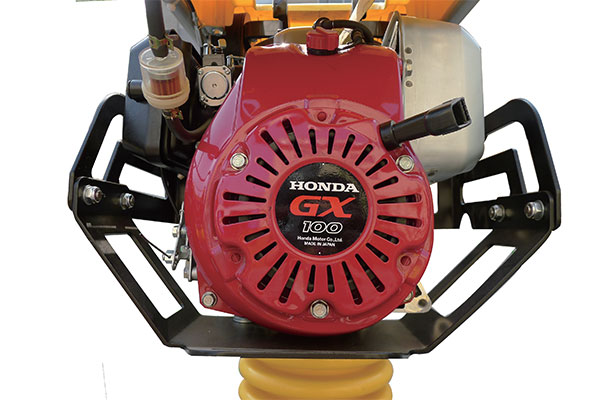
Robust Engine
Equipped with a powerful, reliable engine from renowned brands, ensuring smooth performance with low noise, minimal maintenance, and fuel efficiency.
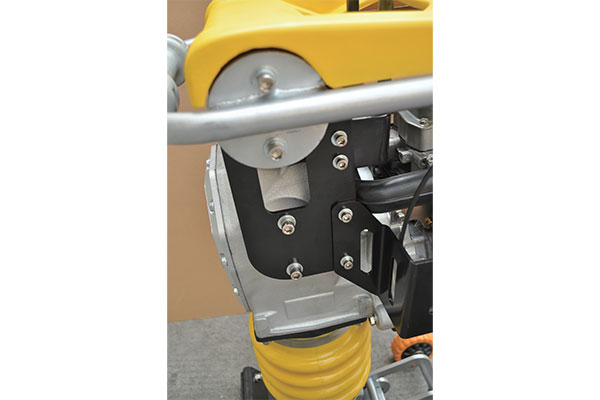
Advanced Shock Absorption System
Enhanced shock-absorbing design significantly reduces vibration to the operator’s hands, providing a comfortable and controlled operation experience.
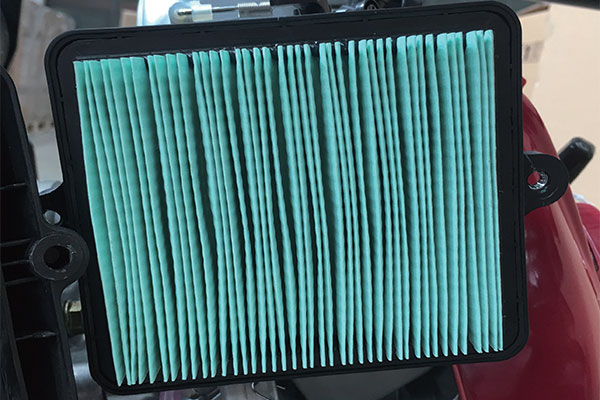
Efficient Air Purification System
A sophisticated air filter system effectively traps dust and debris, keeping the engine cleaner and reducing maintenance needs for extended performance life.
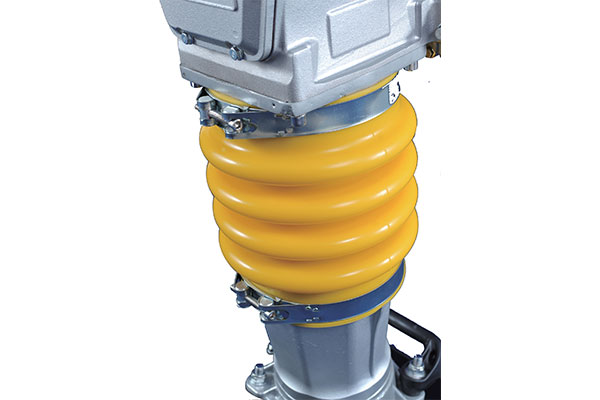
Polyurethane Folding Bellow
High-strength, flexible polyurethane bellow offers improved durability and longevity, resisting cracking and deformation even under heavy-duty use.
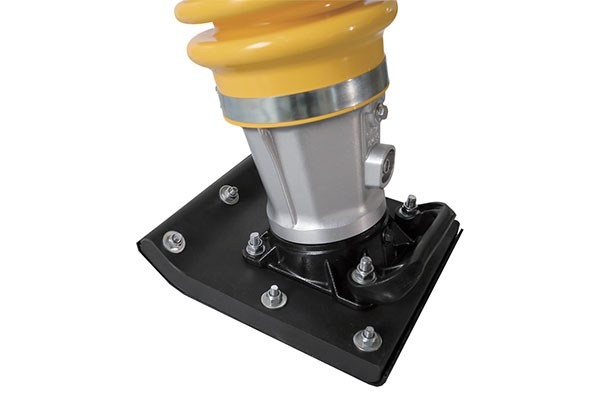
Durable Baseplate
A reinforced baseplate built from high-quality steel, designed for maximum stability and optimal compaction efficiency on various terrains.
QUESTIONS & ANSWERS
Rammer compactors are highly effective on cohesive soils, such as clay and silt, due to their strong impact force, which pushes down and compacts tightly. They can also be used on granular soils, but vibratory compactors might be more efficient for sandy or gravelly terrains.
While gasoline-powered rammers generally offer more power, electric models are catching up with technological improvements. For most light-to-medium-duty tasks, electric compactors can perform comparably to gasoline models, with the added benefit of reduced emissions and noise.
Yes, rammer compactors are often used in small asphalt repair projects where precise compaction is required, such as pothole filling or small pavement patches. However, for larger asphalt areas, a vibratory plate compactor or roller may be more suitable.
Operators should wear PPE, including gloves, safety glasses, and hearing protection. Training in proper operation, keeping a firm grip on handles, and avoiding sharp or unstable ground surfaces are all crucial to safe operation.
If your project involves compacting soil within narrow trenches, such as for pipeline installation, a trench rammer is ideal due to its slim design. Standard rammers are better suited for more open, general-purpose compaction tasks.
Other Similar Products
Concrete Saw PME-Q350
Road Saw PME-Q300
Ride On Vibro Roller PME-R6000
Road Roller Compactor PME-R3500
Construction Road Roller PME-R3000
Double Drum Road Roller PME-R2500
20+ Years of Experience
Construction Machine Manufacturer
Professional manufacturer of small construction machinery, main products include plate compactor, tamping rammer, road roller,floor saw, concrete vibrator, generator etc.
Tamping Rammer
Tamping rammers play a vital role in modern construction, widely used for their efficiency in compacting soil, gravel, and other granular materials. Known for their high-impact motion, tamping rammers stabilize soil, providing strong foundations for roads, pathways, and buildings. providing the compacted surfaces necessary for various building applications. Their powerful impact force and versatility make them a top choice for contractors and builders alike, ensuring strong and reliable foundations in every project.
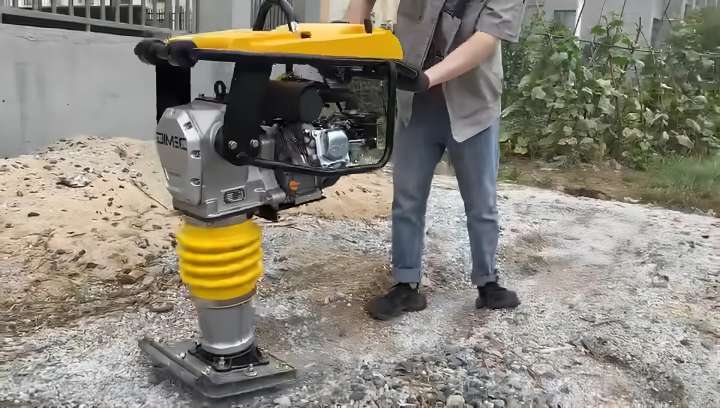
Rammer Compactors: A Key Tool for Ground Preparation
In construction, quality ground preparation is the backbone of any successful project, and few tools serve this purpose as effectively as rammer compactors. From strengthening soil to ensuring stability for infrastructure, rammer compactors offer the precision and power needed for a variety of ground preparation tasks. This article explores the role of rammer compactors in construction, highlighting their features, applications, benefits, and more.
1. Introduction to Rammer Compactors
Construction sites rely on stability, and a well-compacted ground is critical to achieve that. Rammer compactors play an essential role in compacting soil, sand, gravel, and other materials, creating a solid foundation for further construction activities. Unlike larger compactors, rammers are designed for precise, small-scale compaction tasks, especially in tight or challenging spaces. Their portability and targeted impact make them invaluable for tasks like preparing the ground for pavements, trenches, and small structures.
2. What are Rammer Compactors and How Do They Work?
Rammer compactors are mechanical devices designed to apply intense force onto the ground, reducing air pockets in the soil and increasing its density. They work through a repetitive tamping action, with each strike pushing down to compact the material underneath. This compacting process is crucial for avoiding ground settlement issues, especially in load-bearing structures.
2.1 The Basics of Ground Compaction
Compaction is the process of increasing soil density by expelling air from the void spaces. Properly compacted ground improves stability and load-bearing capacity, reducing the risk of shifting or erosion over time. In applications where precision is required, such as around pipelines and foundations, rammer compactors offer an ideal solution.
2.2 Rammer Compactors: Design and Components
Typically, a rammer compactor consists of a handle, a powerful motor or engine, and a compacting foot. The foot, also known as a plate or shoe, repeatedly strikes the ground with considerable force, driven by the motor. Many models feature ergonomic handles to reduce user fatigue, and some include adjustable settings to control the impact force and frequency.
3. Types of Rammer Compactors
Rammer compactors come in various models to meet different construction needs. The choice of model often depends on the type of ground to be compacted and the project’s specific requirements.
3.1 Standard Rammers
Standard rammers are versatile tools ideal for compacting granular soils and cohesive materials. These models offer a balance of power and maneuverability, making them suitable for general-purpose applications.
3.2 Vibratory Rammers
Vibratory rammers introduce vibration into the compaction process, enhancing their effectiveness on dense materials like asphalt and clay. The additional vibration helps settle particles more efficiently, achieving a higher degree of compaction.
3.3 Trench Rammers
Designed for use in narrow spaces, trench rammers have a slender footprint, allowing them to fit inside tight trenches and areas where standard rammers may be too bulky. These models are ideal for compacting soil around pipelines and utility installations.
4. Key Features of Rammer Compactors
Rammer compactors come with several distinctive features that enhance their functionality and ease of use. Choosing the right rammer involves understanding how each feature benefits specific tasks.
4.1 Weight and Balance
The weight of a rammer compactor is a critical factor in its performance. Heavier rammers generally deliver a stronger impact, suitable for more compacted soil types, while lighter models are better for areas where delicate handling is required. The balance between weight and handling affects user control and efficiency.
4.2 Power Source Options: Gasoline vs. Electric
Rammer compactors are typically powered by gasoline or electric engines. Gasoline-powered rammers are known for their portability and ability to deliver high power in remote areas. Electric rammers, while generally quieter and cleaner, require a power source and may be more suitable for sites with easy access to electricity.
4.3 Impact Frequency and Force
The impact frequency and force of a rammer determine how effectively it can compact the ground. High-impact models are beneficial for hard soils, while adjustable impact levels can be advantageous in applications where a gentler approach is required.
5. Applications of Rammer Compactors in Construction
Rammer compactors are highly versatile and find applications across a wide range of construction scenarios. Their compact design and powerful impact make them ideal for targeted compaction in areas that larger equipment cannot reach.
5.1 Soil and Sand Compaction
In road construction and landscaping, compacting soil and sand is essential to prevent shifting or erosion. Rammer compactors are frequently used for compacting these materials, especially in smaller or confined spaces.
5.2 Asphalt and Pavement Work
For pavement repairs or new asphalt installations, rammers provide the necessary pressure to bond the asphalt and prevent cracking over time. Their impact and portability make them perfect for patchwork and small areas of asphalt placement.
5.3 Pipeline and Utility Trench Compaction
When laying pipelines or utility lines, compacting the ground around the installation helps prevent settling that could lead to pipe damage. Trench rammers are particularly useful for this purpose, ensuring that the ground around utilities is solid and stable.
6. Advantages of Using Rammer Compactors
Rammer compactors offer several benefits that make them a preferred choice for contractors and construction crews, especially in projects that demand precise ground preparation.
6.1 Enhanced Soil Stability
One of the primary benefits of using a rammer compactor is the increased soil stability it provides. By compressing soil and reducing the void spaces, these compactors create a solid base that resists shifting and settling. This stability is particularly valuable in projects involving structural foundations, ensuring that the ground remains firm and secure for years to come.
6.2 Increased Work Efficiency
Rammer compactors are designed to be efficient, allowing workers to compact soil quickly and with minimal effort. Their powerful impact and targeted design enable faster compaction in small or difficult-to-reach areas, reducing the need for larger, cumbersome equipment. This efficiency not only saves time but also allows for smoother project timelines.
6.3 Cost Savings and Durability
With proper maintenance, rammer compactors are highly durable and can withstand demanding work conditions over long periods. Their robust construction and ability to handle tough jobs mean that companies can save on frequent replacements and repairs. Additionally, the enhanced ground stability they provide helps prevent costly issues like foundation settling, which can lead to expensive repairs in the future.
7. Choosing the Right Rammer Compactor for Your Project
Selecting the right rammer compactor involves considering various factors specific to the needs of the project. The correct choice can make a significant difference in both efficiency and effectiveness.
7.1 Project-Specific Requirements
Different projects require different types of compactors. For instance, if the project involves compacting clay or dense soil, a vibratory rammer may be ideal due to its additional vibration capabilities. For pipeline work in narrow trenches, a trench rammer would be a better choice due to its slim design. Evaluating the type of soil, the area size, and any obstacles helps ensure the right rammer is selected.
7.2 Budget and Maintenance Considerations
Budget is another important factor when choosing a rammer compactor. While high-powered models with advanced features might have a higher upfront cost, they can offer long-term savings in terms of durability and reduced maintenance needs. On the other hand, a basic model may be sufficient for occasional or lighter work, offering a budget-friendly option without compromising quality.
8. Maintenance Tips for Rammer Compactors
To keep a rammer compactor running effectively, regular maintenance is essential. Proper upkeep not only extends the life of the machine but also ensures it performs at its best on the job.
8.1 Regular Cleaning and Inspection
After each use, it’s important to clean the rammer compactor, especially the foot or shoe, which comes into direct contact with the soil. Dirt buildup can affect compaction efficiency and even cause wear on moving parts. Additionally, performing a visual inspection can help spot any loose or damaged components early on, preventing costly repairs.
8.2 Engine and Component Care
For gasoline-powered rammers, regular engine maintenance—such as oil changes, air filter cleaning, and spark plug replacement—is crucial. Battery-operated or electric models also require periodic checks to ensure the power source remains reliable and effective. Lubricating moving parts can also prevent friction-based wear.
8.3 Troubleshooting Common Issues
Common issues with rammer compactors include reduced impact force, engine problems, and component wear. Regular inspections can identify these issues before they escalate. For example, if the rammer is not delivering sufficient impact, checking for clogs in the shoe or foot, as well as ensuring proper engine performance, can often resolve the issue quickly.
9. Safety Precautions When Using Rammer Compactors
Rammer compactors are powerful tools, and safety should always be a priority when operating them. Following established safety guidelines helps protect workers and ensures the equipment is used responsibly.
9.1 Personal Protective Equipment (PPE)
Operators should always wear appropriate PPE, including gloves, safety goggles, and steel-toed boots, when using a rammer compactor. Hearing protection may also be necessary, especially when working with gasoline-powered models that produce high noise levels.
9.2 Safe Operation Guidelines
Operators must be trained to handle the rammer compactor correctly. Safe operation includes maintaining a stable stance, using the handles for balance, and avoiding sharp movements that could lead to loss of control. Operating the compactor at a steady pace and avoiding uneven surfaces helps ensure consistent compaction and reduces the risk of injury.
9.3 Emergency Procedures
In case of equipment failure or an accident, having an emergency plan in place is essential. This may include shutting off the power source, moving to a safe location, and contacting appropriate personnel for assistance.
10. Environmental Considerations with Rammer Compactors
Modern construction practices increasingly emphasize environmental sustainability, and rammer compactors can support this through energy-efficient models and emissions control features.
10.1 Noise and Emission Control
Gasoline-powered compactors, while powerful, can produce emissions and noise that impact the surrounding environment. Choosing models with noise-reducing technology and low-emission engines can help mitigate these effects, making them suitable for use in residential or environmentally sensitive areas.
10.2 Energy Efficiency and Sustainability
Electric and battery-operated rammer compactors are becoming more popular due to their cleaner operation and reduced carbon footprint. These models are energy-efficient, produce zero emissions during use, and can be a more environmentally friendly choice, especially for projects where sustainability is a key consideration.
11. Popular Brands and Models of Rammer Compactors
The construction industry offers a range of rammer compactor brands, each with its own strengths. Understanding the options can help in selecting a reliable, high-performance model.
11.1 Wacker Neuson Rammer Compactors
Wacker Neuson is known for its durable and high-performing compactors. Their models often feature advanced ergonomics and vibration control, making them a preferred choice for heavy-duty applications.
11.2 Honda-Powered Rammers
Rammers powered by Honda engines are known for reliability and fuel efficiency. These models deliver consistent power and are often favored by contractors for their long-lasting performance and easy maintenance.
11.3 Battery-Operated Models
Battery-operated rammers are gaining popularity due to their environmental benefits and reduced operating noise. These models are particularly useful in urban areas or projects with strict noise restrictions.
12. Innovations in Rammer Compactor Technology
As construction technology advances, so do the tools essential to ground preparation. Recent innovations in rammer compactors focus on efficiency, ease of use, and reducing environmental impact, making these machines even more effective and sustainable.
12.1 Advances in Compaction Efficiency
Manufacturers are continually refining rammer compactors to improve compaction efficiency. Newer models incorporate enhanced impact mechanisms that deliver higher force with each strike, allowing workers to achieve optimal compaction in fewer passes. This increase in efficiency not only speeds up project timelines but also reduces fuel or battery consumption, contributing to cost savings.
12.2 Noise Reduction and Ergonomics
Working with rammer compactors can be physically demanding, especially over extended periods. Innovations in ergonomics, such as vibration-reducing handles and adjustable grip designs, have made operating these machines more comfortable for users, helping to reduce fatigue and strain. Noise reduction features, including insulated engine compartments and quieter motor designs, further enhance the user experience, making rammer compactors suitable for noise-sensitive environments.
12.3 Digital Monitoring Features
Some of the latest rammer compactors come equipped with digital monitoring systems that track operational data like impact force, engine health, and usage duration. This real-time data allows operators to optimize compaction performance and identify maintenance needs before problems arise. Digital tracking can also help companies monitor tool usage, improve efficiency, and ensure safety protocols are followed.
13. Conclusion: The Importance of Rammer Compactors in Construction
Rammer compactors are indispensable tools in the construction industry, contributing significantly to the quality and durability of foundations, pavements, and utility installations. Their ability to provide focused, powerful compaction in tight spaces makes them ideal for projects requiring precision and stability. By investing in a high-quality rammer compactor and following proper maintenance and safety protocols, contractors can ensure their projects stand the test of time.
In the ever-evolving field of construction, rammer compactors remain a staple for efficient ground preparation. As technology advances, these machines continue to become more effective, user-friendly, and environmentally responsible, cementing their status as a key tool for ground preparation in construction.
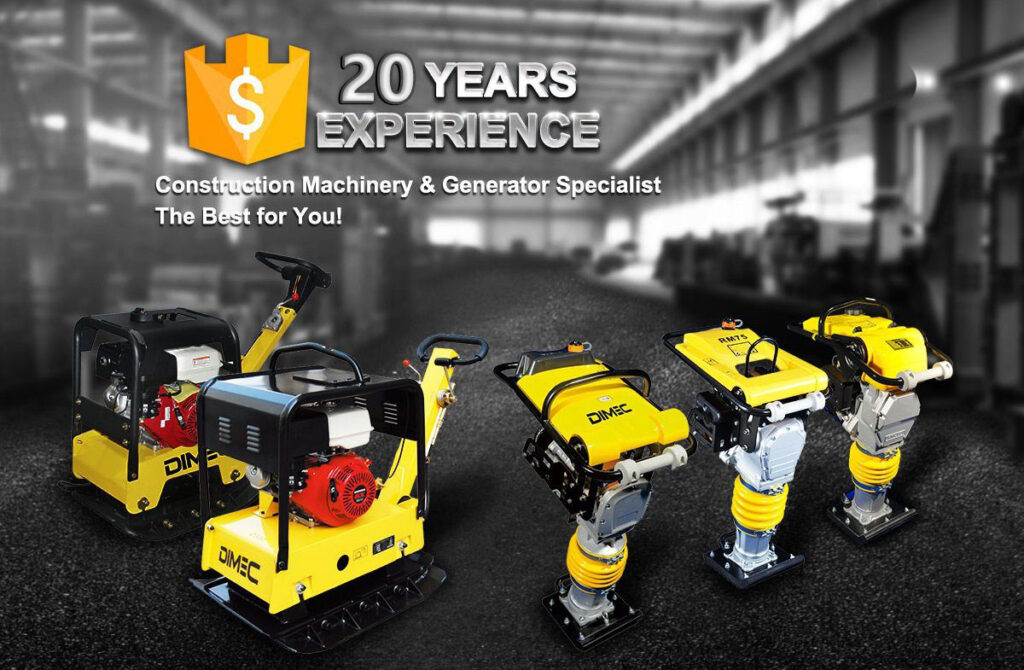
About Us
Wuxi Pinnacle Mechanical Equipment Co., Ltd. (PME) As a first-class specialty enterprise we serve global clients. PME specialize on production of plate compactor, tamping rammer, floor saw, concrete vibrator for global construction industry. We also produce engine, generator, and water pump. PME’s strengths are rooted from our strong team and rich resources.
We have complete production and assembly lines for different machines. There is a team of chief engineers, senior technicians and QC inspectors, equipped with a variety of finishing, spare parts inspection and product testing equipment, to safeguard production and innovation. Thus, we can control every step of production, from finish machining of spare parts, steel plate cutting and welding, spraying paint, all the way to product assembly. This results in effective product quality control.
With more than 20 years of exporting experience, PME has been exporting to over 68 countries and regions including North America, South America, Europe, Southeast Asia, Middle East, Africa. We also form strategic corporations with many multinational companies.
Factory Show
Let our expertise in custom Forward Plate Compactor take your projects to the next level.
Why Choose Us
Professional construction machinery manufacturer with OEM service
We are a leading manufacturer in the construction machinery industry, offering top-notch Original Equipment Manufacturer (OEM) services. Our commitment to innovation and precision engineering ensures that our machinery meets the specific needs of our clients, providing customized solutions that enhance efficiency and performance on the job site.
20 years production and exportation experience
With two decades of experience in production and exportation, we have built a strong reputation for delivering reliable and high-quality construction equipment worldwide. Our extensive knowledge and expertise in the industry enable us to understand the unique challenges of different markets, ensuring our products are tailored to meet global standards.
20+ types of construction site equipment are available for selection
We offer a diverse range of over 20 types of construction site equipment, catering to various industry needs. From heavy-duty machinery to specialized tools, our product lineup is designed to support every phase of construction, providing our clients with the flexibility to choose the right equipment for their projects.
10+ years QC monitor products quality
Our rigorous quality control processes have been refined over more than 10 years, ensuring that every piece of equipment we produce meets the highest standards. Our dedicated QC team meticulously monitors every stage of production, guaranteeing that our products deliver consistent performance and durability in the field.
8+ years experienced skilled workers
Our team comprises highly skilled workers with over 8 years of experience in the construction machinery industry. Their expertise and dedication are reflected in the precision and craftsmanship of our products, ensuring that every detail is executed to perfection.
8 workshops, 12 production lines
With 8 state-of-the-art workshops and 12 production lines, our manufacturing capabilities are designed to meet large-scale demands efficiently. Our advanced facilities allow us to maintain a streamlined production process, ensuring timely delivery of high-quality machinery to our clients around the world.
Unlock Superior Construction Efficiency with Our Expertly Engineered Machinery
Discover a world of advanced construction equipment tailored to meet the demands of modern job sites. With 20 years of industry experience and a commitment to quality, our machinery is designed to boost productivity and ensure reliability in every project. Explore our diverse range and experience the difference of precision-engineered solutions.




